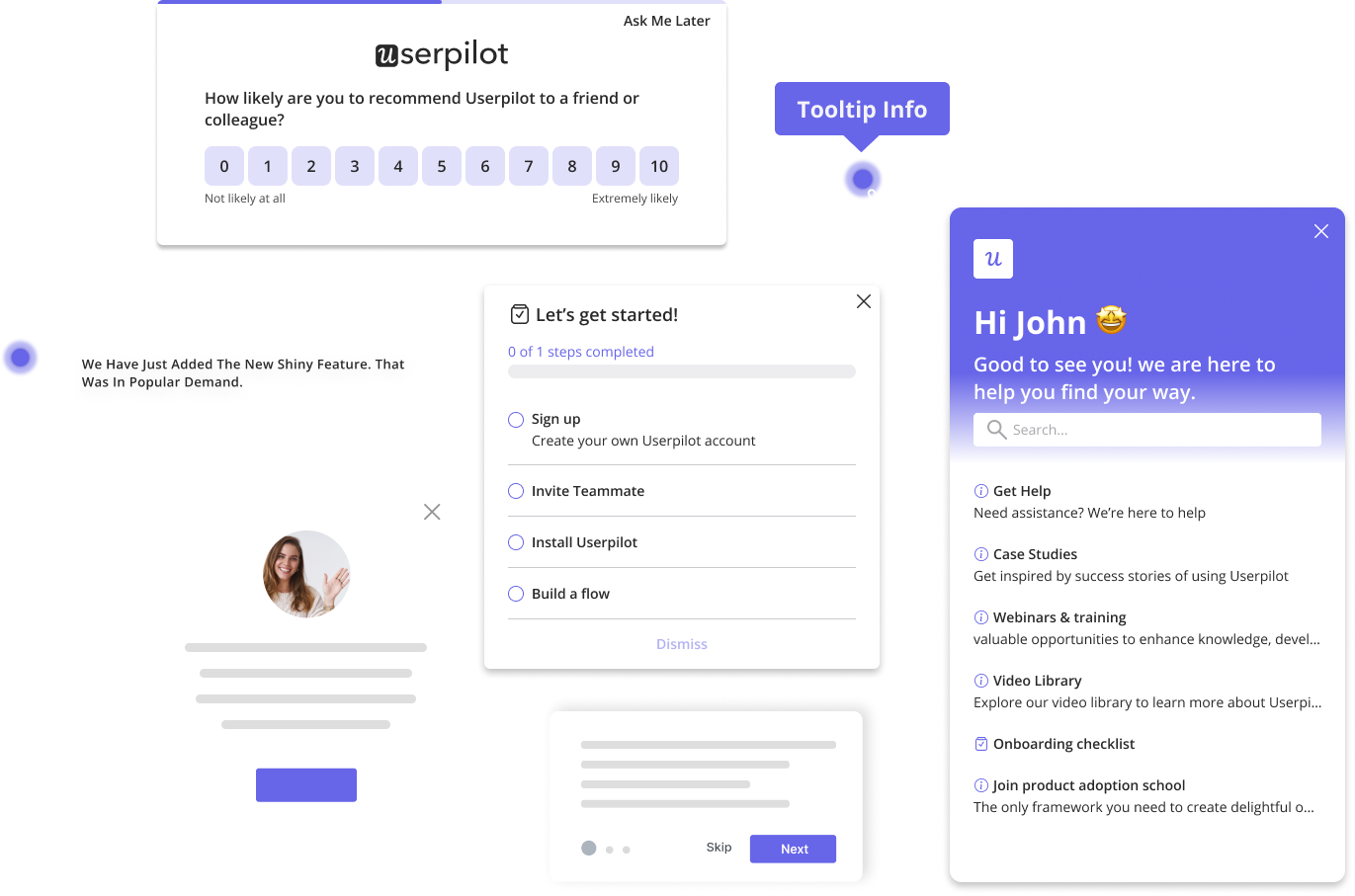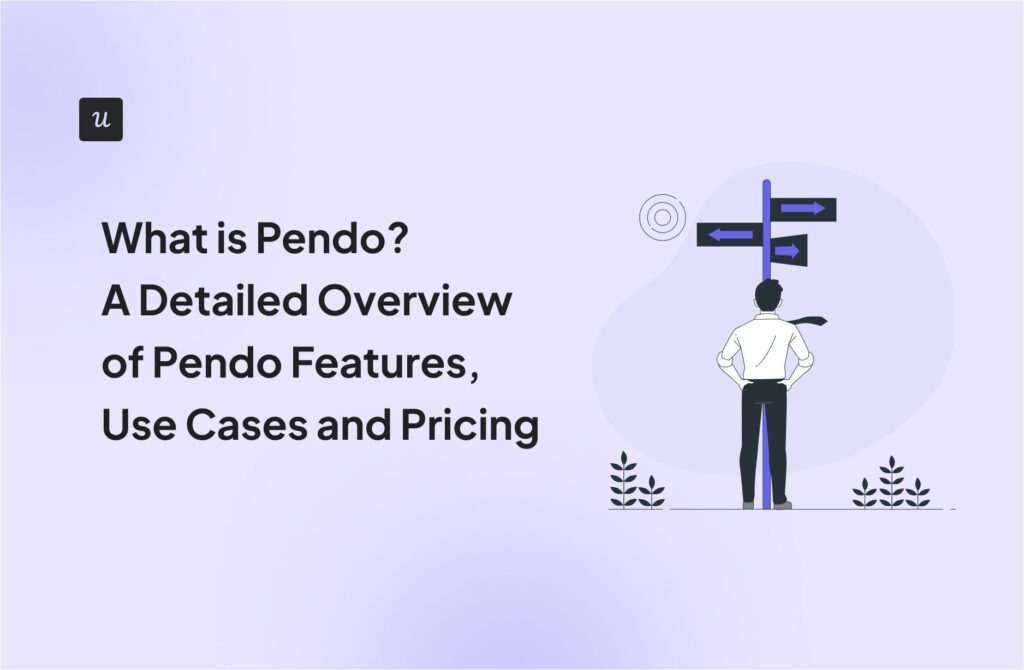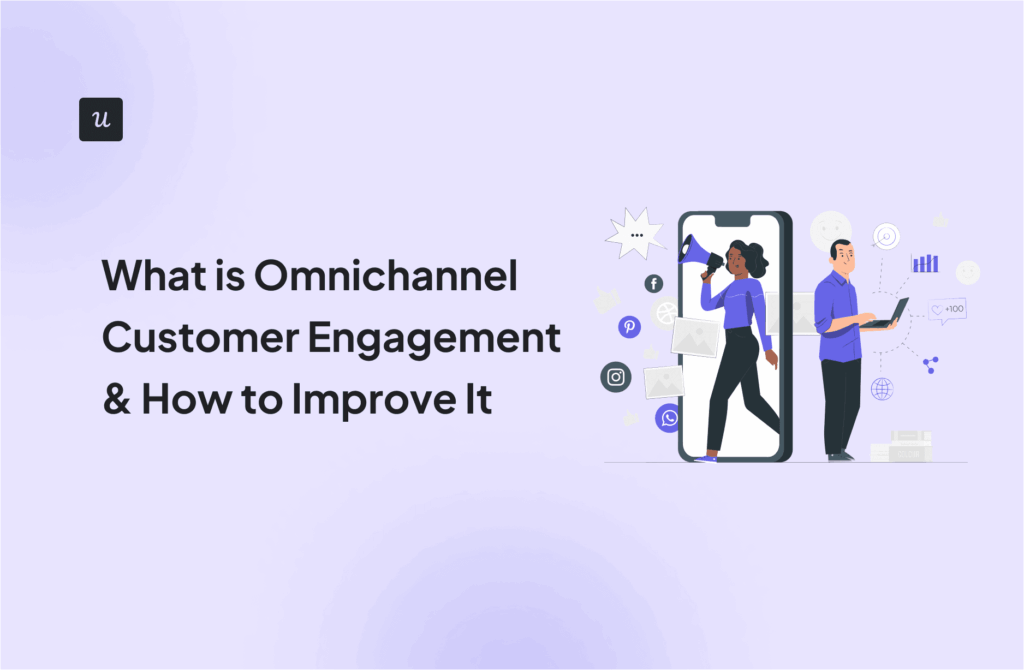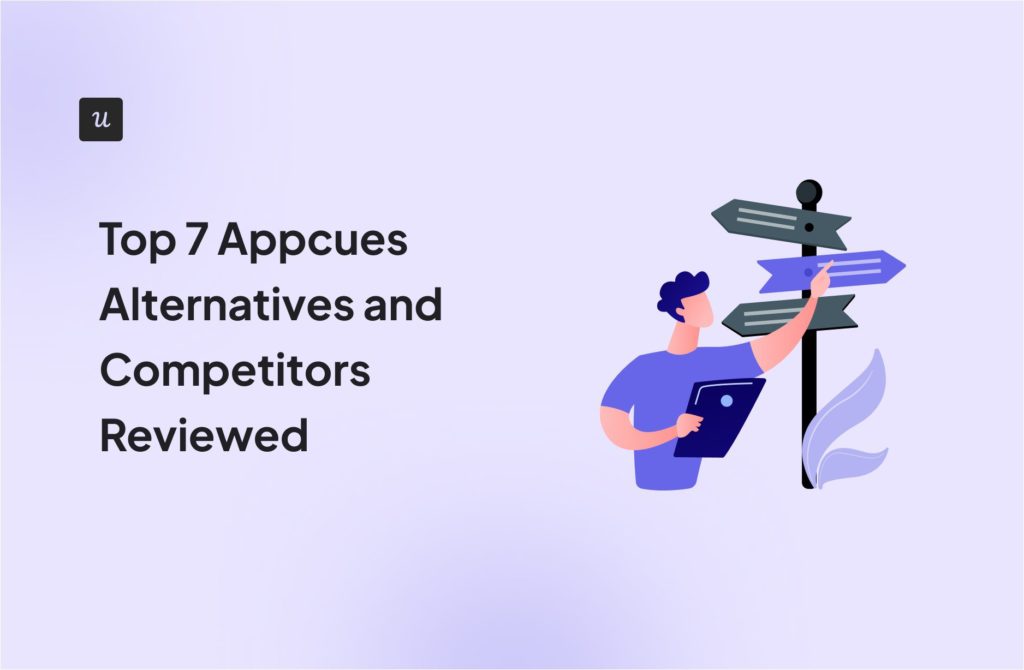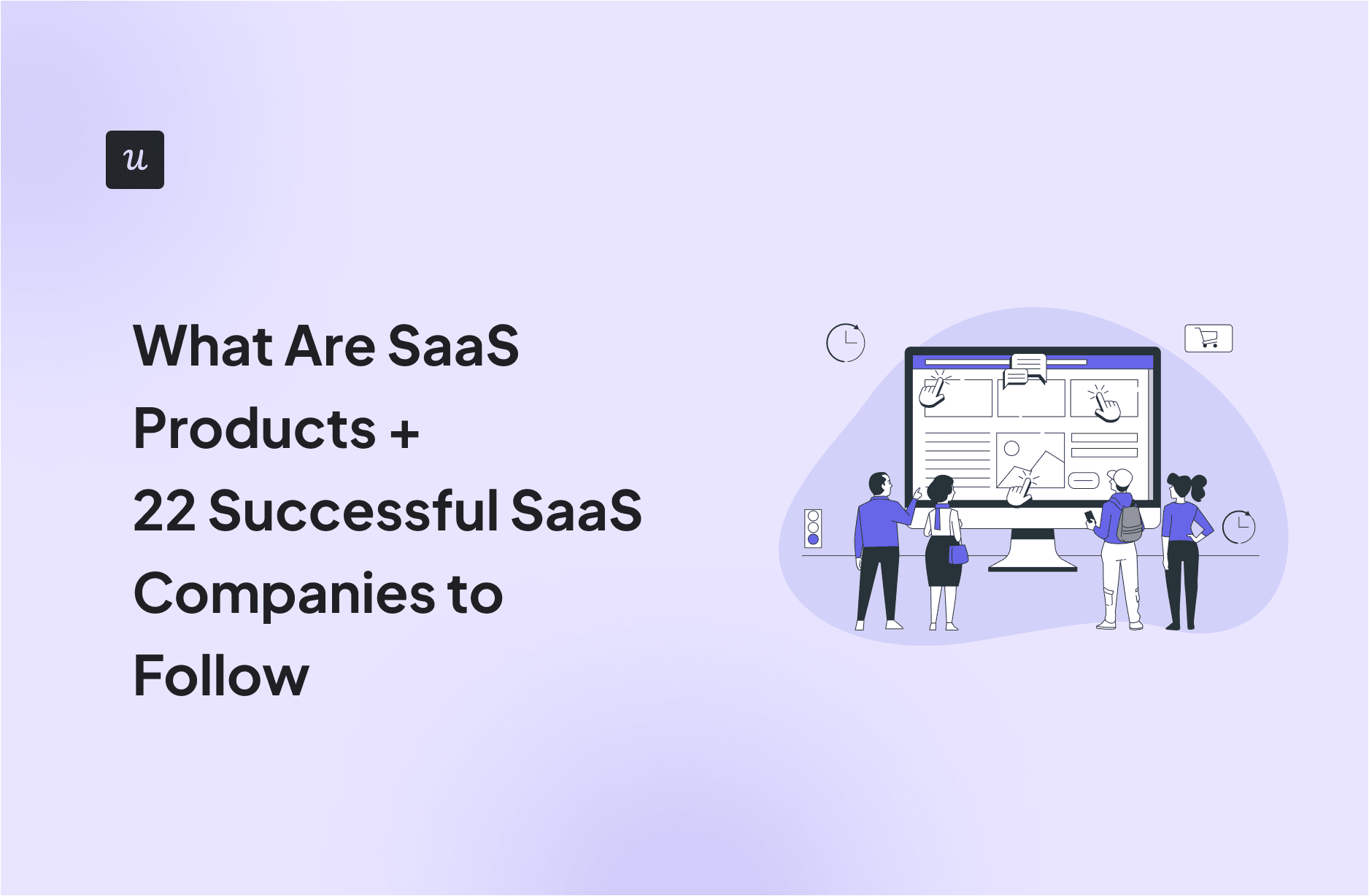
What Are SaaS Products + 22 Successful SaaS Companies to Follow
There are many SaaS products, but knowing that, how do you choose the best?
This article will look at the most successful SaaS companies, so you can decide if you want to invest in them for your business.
Get The Insights!
The fastest way to learn about Product Growth, Management & Trends.
What is a software as a service product?
Software as a Service, or SaaS, is a method of software delivery in which applications are hosted remotely by a service provider and accessed by users over the internet. This model eliminates the need to install, maintain, or update the software locally, as the provider manages all these tasks.
SaaS products are designed for a broad audience, appealing to business-to-business (B2B) and business-to-consumer (B2C) markets.
SaaS vs. PaaS vs. IaaS
In cloud computing, there are three main models for delivering services: traditional Software as a Service (SaaS), Platform as a Service (PaaS), and Infrastructure as a Service (IaaS) – each offering different levels of control and management.
Software as a Service (SaaS): SaaS providers have ready-to-use software applications over the internet on a subscription basis. You don’t handle maintenance or updates. Examples include Netflix, Microsoft 365, and Salesforce.
Platform as a Service (PaaS): PaaS is an internet software that supplies a framework for developers to build and deploy applications without managing servers or networks. This is ideal for developers who focus on software creation. Notable PaaS providers include Google App Engine, Adobe Commerce, and Heroku.
Infrastructure as a Service (IaaS): IaaS offers virtualized computing resources via the Internet. It’s suitable for businesses wanting control over their infrastructure and the ability to scale. Key examples are Amazon Web Services (AWS), Microsoft Azure, and Google Cloud Platform, which provide scalable resources like virtual servers and storage.
What are the benefits of the SaaS model?
The Software as a Service (SaaS) business model is renowned for its efficiency and flexibility, offering numerous advantages for businesses of all sizes.
Below are the key benefits of adopting a SaaS approach for your business operations:
- Cost-effectiveness: A SaaS product eliminates the need for upfront hardware purchases, software licenses, and ongoing maintenance costs – reducing IT expenditures. Most SaaS companies offer a scalable pricing model that adjusts based on usage – ideal for managing budgets effectively.
- Scalability: SaaS companies are highly scalable, allowing you to easily modify the number of users or services as needed. This adaptability is essential for high-growth companies that require rapid scaling without significant initial IT investments.
- Maintenance-free: The SaaS company handles all maintenance and updates, freeing you from the related burdens and costs. This lets you focus more on core activities rather than software development.
- Accessibility: Accessible from anywhere with an internet connection, SaaS applications can be used no matter where you reside.
- Easy integration: Designed for seamless integration with other traditional software systems, SaaS applications help avoid compatibility issues – making adopting new technologies easier and streamlining business processes.
- Inclusive product design: Providers prioritize inclusive product design within the SaaS industry, ensuring their tools are accessible and usable for diverse users.
What are the drawbacks of SaaS software solutions?
While SaaS offers numerous benefits, like any technology, it also comes with its share of challenges. Below are some key drawbacks to consider when opting for SaaS tools in your business operations:
- Dependence on SaaS providers: Any downtime, bugs, or performance issues on the provider’s end can directly impact the availability and reliability of the application. Frequent issues can lead to significant disruptions in service.
- Data security concerns: Storing data in the cloud means that sensitive company information is managed by a third party, which can raise concerns about data security and privacy. You must verify that your SaaS provider complies with high-security standards, such as SOC 2 Type 2.
- Vendor lock-in: Switching from one SaaS provider to another can be complex, restrictive, and costly – leading to vendor lock-in. This makes it difficult to change platforms even if your needs evolve or you’re dissatisfied with the service.
- Limited customization: While SaaS tools generally offer some customization, they can’t match on-premise solutions with respect to customization. This limitation can significantly hinder you if you have unique processes, are in specialized industries, or have complex products.
Different types of SaaS products
Software as a Service (SaaS) encompasses various web-based software products, each designed to streamline specific aspects of business operations.
Below is an exploration of various types of SaaS products and how they can assist businesses in achieving greater efficiency and effectiveness.
- Product growth tools: These tools enhance product engagement, collect user feedback, and provide analytics to drive product improvements. By leveraging product growth tools, you can refine your offerings based on real-time insights and foster growth through informed decision-making.
- Customer Relationship Management (CRM) Software: CRM systems help you manage and analyze customer interactions and data throughout the customer lifecycle. Effective use of CRM systems can enhance customer service, retention, and the sales process.
- Project management software: This type of software aids in planning, organizing, and managing resource tools and developing resource estimates. Comparing the roles of product and project managers can provide deeper insights into how this software fits within broader business operations.
- Enterprise Resource Planning (ERP) System: ERP systems integrate various functions into one complete system to streamline processes and information across your organization. They are especially useful in enterprise environments.
- Collaboration and communication tools: These tools facilitate effective internal and external communications, ensuring that teams can work efficiently regardless of their physical locations.
- Financial management software: This software is crucial for tracking financial activities, managing budgets, and ensuring financial compliance and reporting.
- Customer service software: Essential for managing customer support and assistance, this software often includes features like ticketing systems and live chat. Incorporating self-service software elements can further enhance customer service’s efficiency and accessibility.
- Marketing automation tool: These tools automate repetitive tasks related to marketing, such as emails, social media, and other website actions. Automation helps scale marketing efforts and measure campaign effectiveness, which is critical for marketing teams focused on growth.
22 SaaS solutions to follow in 2024
Here are 22 SaaS companies that stand out for their innovative features, user-friendly design, and potential to drive significant growth across various industries.
1. Userpilot
Userpilot is a leading product growth tool specifically designed for B2B industries, focusing on enhancing user engagement and streamlining product management processes.
Some of Userpilot features are:
- In-app engagement: Userpilot excels in creating immersive onboarding experiences that educate and communicate with customers directly within the app.

Display in-app notifications with Userpilot.
- Product analytics: Userpilot’s comprehensive analytics allows you to track customer behavior through funnel analysis, path analysis, and dashboards, gaining deep insights into user interactions.

- Customer feedback: This feature allows you to trigger in-app surveys, analyze responses, and automate feedback collection, making it easier to gather and act on customer insights.

- Customer support: Userpilot offers an in-app resource center that can integrate with live chatbots, providing real-time support and improving user experience.

- Integrations with leading tools: Userpilot integrates with popular tools like Salesforce, HubSpot, and Zendesk, enabling enhanced functionality and connectivity across different software platforms.

2. HubSpot
HubSpot is a comprehensive CRM SaaS company designed for B2B and B2C industries. It offers a wide range of marketing, sales, and service software solutions to help businesses grow efficiently.
Some of Hubspot’s features are:
- Analytics: HubSpot provides robust analytics tools that help businesses track and analyze their marketing, sales, and customer service performance.
- Surveys: With HubSpot, companies can easily create, send, and analyze surveys to gather valuable customer feedback.
- Integrations: HubSpot boasts a vast ecosystem of integrations, including a Userpilot integration, allowing businesses to connect with other tools seamlessly.

3. Mixpanel
Mixpanel is an advanced analytics SaaS company designed for both B2B and B2C industries, focused on tracking user interactions to help businesses optimize their SaaS products and improve user engagement.
Some of Mixpanel’s features are:
- User analytics: Mixpanel offers in-depth user analytics that provides insights into how users interact with your applications.
- Reports: With customizable reports, Mixpanel enables you to visualize data and track trends over time.
- Analytics dashboard: Mixpanel’s analytics dashboard presents a comprehensive data view in an easily digestible format.

4. Slack
Slack is a widely recognized collaboration SaaS company that revolutionized internal communication for B2B and B2C industries, facilitating seamless interaction across teams and departments.
Some of Slack’s features are:
- Channels: Slack provides dedicated spaces for teams to discuss and manage projects, allowing for organized conversations grouped by topic, department, or any other category relevant to your business.
- Direct messaging: Users can send private messages to one another, enabling quick questions and discussions without overcrowding group channels.
- Integration capabilities: Slack integrates with many productivity tools and SaaS apps, enhancing its utility by linking with services like Google Drive, Trello, and Salesforce.

5. Asana
Asana is a project management SaaS company that aids B2B and B2C organizations in efficiently organizing, tracking, and managing their work and projects, enhancing team collaboration and productivity.
Some of Asana’s features are:
- Task management: Asana allows teams to create, assign, and prioritize tasks.
- Progress reports: With Asana, teams can generate detailed progress reports informing all stakeholders about a project’s status.
- Customer experience roadmaps: Asana supports the creation of comprehensive roadmaps.

6. Airtable
Airtable is a versatile SaaS company that combines the simplicity of a spreadsheet with the power of a database. It’s designed for B2B and B2C industries to organize work, track projects, and manage data dynamically.
Some of Airtable’s features are:
- Customizable views: Airtable offers various views like grid, calendar, kanban, and gallery.
- Rich field types: Users can utilize a wide range of field types, including checkboxes, dropdowns, dates, and links to records in other tables.
- Templates: A rich library provides a quick start for various projects, from content calendars to event planning.

7. Mailchimp
Mailchimp is a leading marketing SaaS company specializing in email marketing solutions for both B2B and B2C industries. It helps businesses of all sizes manage their marketing campaigns efficiently.
Some of Mailchimp’s features are:
- Audience segmentation: Users can segment their audience based on behavior, preferences, or demographics to target emails more effectively.
- Automation: Automate email workflows to send triggered emails based on specific actions.
- Analytics and reports: Track the performance of email campaigns with detailed analytics and reports.

8. Shopify
Shopify is a comprehensive e-commerce SaaS company designed for both B2B and B2C industries. It enables businesses to set up online stores and sell products globally easily.
Some of Shopify’s features are:
- Product management: Manage products, inventory, and orders efficiently within the platform.
- Payment processing: Shopify integrates with multiple payment gateways, offering secure and versatile payment options for customers worldwide.
- Landing pages: Utilize Shopify’s tools to create effective landing pages that help convert visitors into customers.

9. Netflix
Netflix is a premier streaming B2C service known for its vast selection of films, television series, and documentaries.
Some of Netflix’s features are:
- Personalized recommendations: Utilizing advanced algorithms, Netflix provides personalized viewing recommendations based on user preferences and viewing history.
- Multiple profiles: Users can create multiple profiles under a single account, allowing different family members to have personalized viewing experiences.
- Offline viewing: Netflix allows users to download content to their devices, enabling offline viewing without internet connectivity.

10. Typeform
Typeform is a versatile tool for creating engaging online forms, surveys, and quizzes. It is a popular choice for both B2B and B2C industries looking to collect information and interact with users.
Some of Typeform’s features are:
- Interactive forms: Typeform’s unique design allows interactive and engaging surveys that improve completion rates and user satisfaction.
- Customization options: Users can customize their forms and surveys to match their brand style and preferences.
- Logic jumps: Typeform supports logic jumps that personalize the questions based on the user’s previous answers.

11. ActiveCampaign
ActiveCampaign is a cloud SaaS company that excels in customer experience automation. It combines email marketing, marketing automation, sales automation, and CRM for both B2B and B2C sectors.
Some of ActiveCampaign’s features are:
- Email marketing: ActiveCampaign provides advanced email marketing capabilities, allowing users to send targeted email campaigns that drive engagement and conversions.
- Marketing automation: Streamline your marketing processes and personalize customer interactions with ActiveCampaign’s powerful marketing automation tools.
- Segmentation and personalization: Segment contacts based on behavior and preferences and deliver personalized content that resonates with different audience segments.

12. Appcues
Appcues is a powerful platform designed to help SaaS companies improve user onboarding, adoption, and retention. It serves both B2B and B2C industries with intuitive in-app messaging and guidance.
Some of Appcues’s features are:
- User onboarding: Appcues enhances user onboarding experiences with targeted walkthroughs and onboarding flows for both mobile and web users.
- In-app messaging: Deliver targeted messages and announcements directly within your app to engage users immediately.
- Feature adoption: Drive feature adoption with interactive tooltips and guided tours highlighting new and underused features.

13. Salesforce
Salesforce is a global leader in customer relationship management (CRM) solutions, providing tools for sales, customer service, marketing, and more to both B2B and B2C markets.
Some of Salesforce’s features are:
- Customization and scalability: Customize and scale your CRM solution to meet the unique demands of your business.
- Integrations: Numerous integrations, including native SaaS apps and third-party solutions like Userpilot, extend Salesforce’s capabilities.
- Analytics and reporting: Utilize powerful analytics and detailed reporting tools to gain insights into sales trends, customer behavior, and marketing effectiveness.

14. Canva
Canva is an intuitive graphic design platform that revolutionizes how individuals and businesses create visual content. It is accessible to B2B and B2C users so that they can craft professional-level designs easily.
Some of Canva’s key features are:
- Template library: Canva offers a vast library of templates ranging from presentations and social media graphics to print materials.
- Drag-and-drop editor: The user-friendly drag-and-drop interface makes it simple for anyone to create stunning graphics and documents.
- Extensive asset library: Access millions of images, fonts, icons, and illustrations to enhance any design project.

15. Zendesk
Zendesk is a service-first CRM company that builds software designed to improve customer relationships by providing seamless support and sales experiences across multiple channels for both B2B and B2C industries.
Some of Zendesk’s features are:
- Multi-channel support: Zendesk offers support across various channels, including email, phone, chat, and social media.
- Integrations: Enhance your Zendesk capabilities with many integrations that connect seamlessly to other business tools.
- Chatbots and knowledge bases: Utilize Zendesk’s capabilities to implement chatbots for automated responses or develop extensive knowledge bases for customer self-service.

16. QuickBooks
QuickBooks is a comprehensive accounting software solution designed primarily for small to medium-sized businesses. It facilitates streamlined finance management in both B2B and B2C sectors.
Some of QuickBooks’s features are:
- Invoicing: Easily create custom, professional invoices, track them, and manage payments online.
- Expense tracking: Keep a close eye on business expenses by categorizing and tracking them automatically.
- Payroll integration: Integrate payroll seamlessly into your accounting process.

17. Xero
Xero is a cloud-based accounting software tailored for small to medium-sized businesses, streamlining management processes across both B2B and B2C sectors.
Some of Xero’s features are:
- Real-time financial data: Access up-to-date financial information from any device.
- Automated bank feeds: Connect Xero to your bank account for automatic updates and reconciliation, simplifying the management of income and expenses.
- Online invoicing: Manage and track invoices to maintain cash flow with ease.

18. Microsoft
Microsoft is a global technology leader offering a wide array of software products and hardware for both B2B and B2C sectors. Its strong focus is on enterprise solutions.
Some of Microsoft’s features are:
- Enterprise solutions: Microsoft provides comprehensive enterprise solutions, including cloud computing, AI, digital transformation, and more.
- Office productivity suites: Microsoft Office remains the gold standard for productivity software, offering applications like Word, Excel, and PowerPoint.
- Cloud services: With Azure, Microsoft offers scalable services, providing businesses with computing power, database storage, and application services.

19. Oracle ERP
Oracle ERP is a comprehensive enterprise resource planning software that is designed to cater to both B2B and B2C sectors, especially large enterprises seeking robust and integrated management solutions.
Some of Oracle ERP’s features are:
- Fiscal management: Oracle ERP offers advanced financial capabilities that help businesses manage their finances efficiently.
- Supply chain management: Optimize and streamline your operations with tools designed for global supply chain processes.
- Human resources management: Oracle ERP’s human resources module helps you manage your workforce effectively. It includes tools for payroll, benefits, recruitment, and performance management.

20. Intercom
Intercom is a communication platform designed for businesses looking to enhance customer interaction through personalized, messenger-based experiences. It serves both the B2B and B2C sectors.
Some of Intercom’s features are:
- In-app messaging: Deliver targeted, personal messages directly to your app or website users.
- Live chat: Provide real-time support and sales assistance with Intercom’s live chat.
- Surveys: Gather customer feedback efficiently through targeted surveys that can be seamlessly integrated into the user experience.

21. Omnisend
Omnisend is an e-commerce marketing platform that specializes in automating marketing across multiple channels. It is tailored specifically for B2C industries looking to enhance their marketing efforts.
Some of Omnisend’s features are:
- Email marketing: Omnisend enables businesses to send personalized and targeted email campaigns.
- Automation: Streamline your marketing processes with powerful automation that allows you to set up triggered emails, segment your audience, and send timely communications.
- Multi-channel messaging: Reach your customers via SMS, email, push notifications, and more, all from one platform.

22. Brevo
Brevo, formerly Sendinblue, is an email marketing and CRM suite designed for businesses of different sizes and customer bases.
Top features of Brevo:
- Email marketing: Brevo allows users to create and send professional-looking emails to their subscribers. It offers customizable templates, drag-and-drop editors, and A/B testing to streamline the process.
- Marketing automation: Brevo’s marketing automation tools help businesses create automated workflows based on customer behavior – allowing for targeted and personalized communication with customers.
- SMS marketing: With Brevo, businesses can send targeted SMS messages to their customers. This feature is useful for sending promotions, reminders, and other important messages directly to customers’ phones.

Conclusion
SaaS products are great for your business as they can streamline and automate many everyday tasks. And now you have 22 more that you might not have known before that can help you in your business process.
If you want to know more about Userpilot and how it can help your own SaaS product with collecting customer feedback, providing detailed analytics, and creating an onboarding experience, book a demo now!

